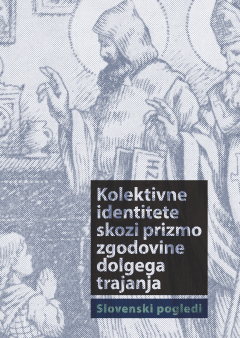Kolektivne identitete skozi prizmo zgodovine dolgega trajanja. Slovenski pogledi
The word phrase “collective identity” denotes a form of social identity that encompasses an individual’s cognitive, moral, and emotional connection with others. Forming group affiliations based on shared attributes is one of basic human characteristics that justifies the application of this modern concept in investigating earlier periods. This is also the subject matter of the studies conducted by twenty-three established researchers from Slovenia and abroad that have contributed their chapters to this volume ('Collective identities through the prism of the history of the longue durée: Slovenian views'). In their discussions, the authors centre on a wide range of topics related to the emergence, development, and changes of collective identities in the history of the longue durée roughly covering the period of a thousand years between the Early Middle Ages and the second half of the twentieth century. The research focuses on the Slovenians and their territory and places them in a wider framework. Through a hybrid chronological–thematic key, the discussions are divided into the following six clusters: The Middle Ages, The Early Modern Period, Christianity and Nation-Building, The Development of the National Movement, Vernacular Culture and Art, and Recent History and Modernity.
Downloads

Series
License

This work is licensed under a Creative Commons Attribution-NonCommercial-NoDerivatives 4.0 International License.
